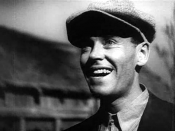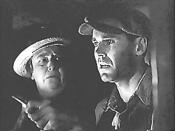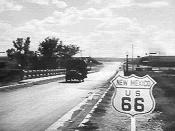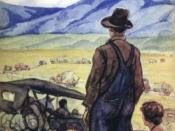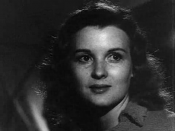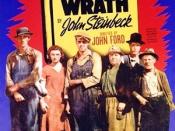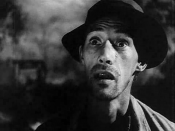Oppress: to dominate harshly; to subject a person or a group of people to a harsh or cruel form of domination. In John Steinbeck's masterpiece "The Grapes of Wrath", the Joads are oppressed in many ways. The bank, the "monster", and big business owners are all seen as oppressors. But through this, the Joads remain resolute, in a way; oppression even strengthens the bonds between them, as they continue their exodus to the "promised land". While the maxim is that oppression always has an adverse effect on people, in Steinbeck's "The Grapes of Wrath", oppression and hardship actually benefit the Joads and those around them.
In Chapter sixteen, the Joad's truck breaks down, so Tom, Casy and Al stay behind to try to fix it while the rest of the family goes ahead. When they find what is wrong with the truck (broken con-rod) they walk to a junk yard, and look for another.
The man who works at the junk yard is not the boss, he is merely an employee. He has also been oppressed by the boss, and this makes him bitter, "â¦You say it's all me, but, by God, he's a son-of-a-bitch. Figgers how bad you need it. I seen him get more for a ring gear than he gave for the whole car." (Page 233) The man first calls the boss a name; afterward, he talks about how the boss is very crafty, he knows he can manipulate needy people to get more money from them. This shows that the man does not like the boss or the way the boss treats customers. The man then sells a con-rod and a socket wrench to Tom and Al for quite a cheap price. So, the Joads actually benefited from the oppression of the boss because this led the employee to sell the con-rod at a lower price than the boss would have in order to spite him.
As the Joads are on the road, they join up with the migrant "families". "In the evening a strange thing happened: the twenty families became one family, the children were the children of all. The loss of home became one lossâ¦" (Page 249) These are families tied together by hardship; and to combat oppression. Within these families, there is also a system to fight hardship: "And a kind of insurance developed in these nights. A man with food fed a hungry man, and thus insured himself against hunger. And when a baby died a pile of silver coins grew at the door flapâ¦" (Page 251) The people shared what they had, so that when they had none, others would share with them. Oppression has taught these people the anguish of hardship; and so they band together to insure that everyone has a share, and no one is oppressed. And it works, albeit very briefly.
In chapter 19, the Joads arrive at a Hoover Ville, and the reception is anything but warm. They are treated like animals, with cops and contractors continually breathing down their necks. But when they arrive at the government camp in Weedpatch, things change, people actually act civilly to each other, and there aren't any cops to abuse them. The people in the government camp act this way because they know what it is like to be oppressed, and so they created a society devoid of oppression. "'â¦Now that committee makes the laws. What they say goes.' 'S'pose they get tough,' Tom said. 'Well, you can vote 'em out jus' as quick as you vote 'em in."' (page 368) Actually, it is impossible for there not to be oppression in a society; but the people of the government camp have found a way around that. When the ruler of the camp, the committee, becomes oppressive, they just elect new leaders.
After Casy gets arrested for "beating" a cop, Tom doesn't see him again until much later in the book. When Tom does meet Casy again in chapter 20, he has come a long way: he's now the leader of a labor union, and he's organized a strike. Unfortunately, some men come and kill Casy, which makes Tom go crazy. "Yeah! Pa. You see? Casy was still a - good man. Goddamn it, I just can't get that pitcher outa my head. Him layin' there - head jus' crushed flat an' oozin'. Jesus!" (Page 501). Tom then attacks the man who kills Casy and kills him too, forcing Tom into hiding; but then, Ruthie slips: "Ruthie said our brother already kil't two fellas⦠Well, our brother's a-hidin' right now from killin' a fella, an' he can kill that big girl's brother too." (Page 529)Because of this, ma goes to him and tells him he has to run; however, Tom has a different idea. '"I thought maybe you could go to a big cityâ¦Tom, what you aimin' to do?' 'What Casy done'" (Page 536) Tom plans to join a labor union, just like Casy did. This is the first time that Tom has had an idea like this. The reason that he got this idea was because of Casy's death, which was a product of the oppression of the owners. As the bad conditions in Sallisaw made the Joads pack up and move west, the oppression makes the oppressed rise up in order to resist their oppressors.
At the end of the book, the Joads seek shelter inside a barn. Inside the barn, they find a boy and his father, who are in quite a predicament. "Las' night I went an' bust a winda an' stoled some bread. Made 'im chew 'er down. But he puked it all up, an' then he was weaker. Got to have soup or milk. You folks got money to git milk?" (Page 580) The Joads have no money, but ma and Rose of Sharon come up with a solution. "â¦Rose of Sharon loosened one side of the blanket and bared her breastâ¦" (Page 581). Before everything that had happened, Rose of Sharon would never have breast fed someone she didn't know, even someone she did know for that matter. But hardship and oppression have changed her. She now has empathy for those who have nothing.
Those that have suffered oppression and hardship know the difficulties of living in such a state, so they are willing to help others like them. In chapter 26, Ma says that: "'I'm learnin' one thing good, learnin' it all a time, ever' day. If you're in trouble or hurt or need - go to poor people. They're the only ones that'll help - the only ones" (Page 483) Rich people have never known what it is like to be starving and looking for work, so they have no empathy for the migrants: they think migrants are just dawdlers, pulling down society with their idleness. Because of this, they are not willing to see the migrants' true predicament, and will not help the migrants. But the migrants know what it is like to be hungry, to have to live for a week on less than ten dollars. So they are willing to help others migrants.
Oppression is used by the powerful as a tool in order to shape society into what they want it to be. In some rare cases, the use of oppression is followed by a period of harmony and happiness; as in ancient China, when the emperors "oppression" brought about the creation of the Great Wall, which helped protect China greatly. But, as in the case of Steinbeck's "The Grapes of Wrath", oppression mostly causes anger and discord. "The fields were fruitful, and starving men moved on the fieldsâ¦the great companies did not know that the line between hunger and anger is a thin lineâ¦On the highways the people moved like ants and searched for work, for food. And the anger began to ferment." (Page 365) The business owners and the great tycoons of the Great Depression used oppression not to better the country, but only to reap more profits. But in fact, oppression did not only result in disharmony. The oppression by the owners led the oppressed to band together and in order to defeat hardship and oppression. Where before it was "everyone for himself" everyone started working in unity.
Bibliography:"The Grapes of Wrath", by John Steinbeck
